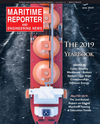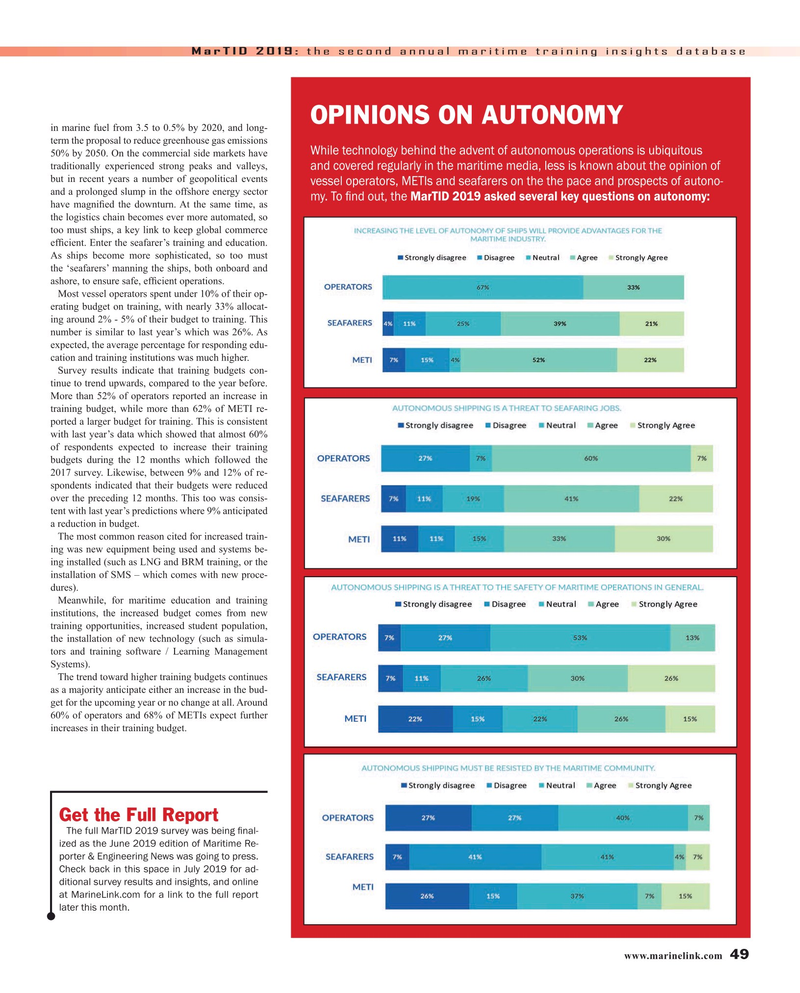
Page 49: of Maritime Reporter Magazine (June 2019)
80th Anniversary World Yearbook
Read this page in Pdf, Flash or Html5 edition of June 2019 Maritime Reporter Magazine
MarTID 2019: the second annual maritime training insights database
OPINIONS ON AUTONOMY in marine fuel from 3.5 to 0.5% by 2020, and long- term the proposal to reduce greenhouse gas emissions
While technology behind the advent of autonomous operations is ubiquitous 50% by 2050. On the commercial side markets have traditionally experienced strong peaks and valleys, and covered regularly in the maritime media, less is known about the opinion of but in recent years a number of geopolitical events vessel operators, METIs and seafarers on the the pace and prospects of autono- and a prolonged slump in the offshore energy sector my. To ? nd out, the MarTID 2019 asked several key questions on autonomy: have magni? ed the downturn. At the same time, as the logistics chain becomes ever more automated, so too must ships, a key link to keep global commerce ef? cient. Enter the seafarer’s training and education.
As ships become more sophisticated, so too must the ‘seafarers’ manning the ships, both onboard and ashore, to ensure safe, ef? cient operations.
Most vessel operators spent under 10% of their op- erating budget on training, with nearly 33% allocat- ing around 2% - 5% of their budget to training. This number is similar to last year’s which was 26%. As expected, the average percentage for responding edu- cation and training institutions was much higher.
Survey results indicate that training budgets con- tinue to trend upwards, compared to the year before.
More than 52% of operators reported an increase in training budget, while more than 62% of METI re- ported a larger budget for training. This is consistent with last year’s data which showed that almost 60% of respondents expected to increase their training budgets during the 12 months which followed the 2017 survey. Likewise, between 9% and 12% of re- spondents indicated that their budgets were reduced over the preceding 12 months. This too was consis- tent with last year’s predictions where 9% anticipated a reduction in budget.
The most common reason cited for increased train- ing was new equipment being used and systems be- ing installed (such as LNG and BRM training, or the installation of SMS – which comes with new proce- dures).
Meanwhile, for maritime education and training institutions, the increased budget comes from new training opportunities, increased student population, the installation of new technology (such as simula- tors and training software / Learning Management
Systems).
The trend toward higher training budgets continues as a majority anticipate either an increase in the bud- get for the upcoming year or no change at all. Around 60% of operators and 68% of METIs expect further increases in their training budget.
Get the Full Report
The full MarTID 2019 survey was being ? nal- ized as the June 2019 edition of Maritime Re- porter & Engineering News was going to press.
Check back in this space in July 2019 for ad- ditional survey results and insights, and online at MarineLink.com for a link to the full report later this month.
www.marinelink.com 49
MR #6 (42-49).indd 49 6/4/2019 8:53:47 AM

 48
48

 50
50
